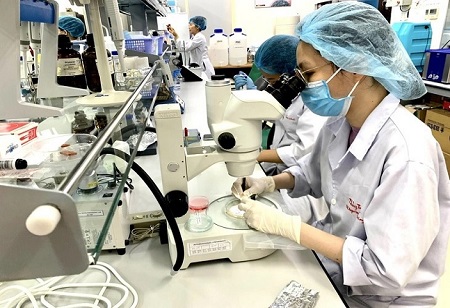Vietnamese higher education institutions prioritize scientific research. Minister Huynh Thanh Dat highlights the crucial role of research in universities. The Prime Minister directs the Ministry of Science and Technology to collaborate on a report addressing obstacles to scientific and technological development. Pham Van Phuc, the director of the Stem Cell Institute at the University of Sciences under VNU-HCM, emphasized that the Stem Cell Research Institute operates as a public science and technology facility with financial independence. A crucial objective is to develop research products for market entry to generate revenue for the institute.
“Technology transfer faces many difficulties because the current policies and laws have not kept up with reality", he said. For example, the Stem Cell Institute has researched and perfected the technology which develops stem cell products to treat degenerative joint diseases. This technology was transferred by the institute to Vạn Hạnh General Hospital in District 10 four years ago. “However, we do not have specific and clear regulations on stem cell products so the hospital cannot bring the stem cell products to market", he said.
The concept of spin-off companies, particularly university spin-off startups, has gained widespread popularity globally. Such entities provide universities with a platform to commercialize their research and intellectual property. Phuc highlighted the importance of adopting this model in Vietnam to facilitate scientific research and technology transfer at universities and educational institutions. Additionally, he recommended that the government commit to sustainable investment in scientific research and innovation while establishing more favorable mechanisms for scientists and investors engaged in research and technology transfer.
Nguyễn Phương Thảo of International University under VNU-HCM said the slow processing of legal documents creates many difficulties for the activities of research and development, and technology transfer. The technology transfer process of scientists in universities also faces numerous difficulties due to regulations under the Law on cadres, civil servants and other public employees.
Creating a clear mechanism for university lecturers to establish spin-off companies is crucial for addressing technology transfer issues. In addition to emphasizing scientific research, universities, notably VNU-HCM, prioritize international publications, particularly in prestigious journals listed in databases like Clarivate's Web of Science and Elsevier's Scopus. As per Scopus data, VNU-HCM has experienced a consistent and significant annual increase of 40% in published articles from 2020 to 2022. The university produced 4,900 articles in international scientific journals from 2016 to 2020, 5,900 articles from 2020 to 2022, and nearly 2,494 articles in 2023. Collaborating with both domestic and international partners, university scientists have successfully published their research works and articles in top-tier journals.
Published scientific projects and articles play a vital role in enhancing VNU-HCM's academic reputation and global rankings. Recently placed in the top 951-1000 of the QS World University Rankings 2024, the university is strategically aligning with Politburo's Resolution No 24-NQ/TW to become a leading higher education institution in Asia, focusing on socio-economic development and defense/security in the southeastern region through 2030 and beyond.
Chancellor Vu Hai Quan highlighted that the project aims to enhance the quality of education, scientific research, and technology transfer, leading to a gradual transformation of higher education. The university's objectives by 2030 include successfully training 140,000 individuals in bachelor's, engineering, architecture, and postgraduate programs, achieving a 90% employment rate for fresh graduates, publishing over 35,000 articles on Scopus, and establishing a national innovative center.

